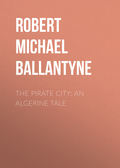
Robert Michael Ballantyne
Freaks on the Fells: Three Months' Rustication
Story 1—Chapter 18.
The Family go to Church under Difficulties
It would seem to be a well-understood and undeniable fact that woman invariably gains the victory over man in the long-run; and even when she does not prove to be the winner, she is certain to come off the conqueror. It is well that it should be so. The reins of the world could not be in better hands!
But, strangely enough, woman triumphs, not only in matters over which she and man have, more or less, united control, but even in matters with which the human race cannot interfere. For instance, in regard to weather—despite the three weeks of unfailing sunshine, Mrs Sudberry maintained her original opinion, that, notwithstanding appearances being against her, the weather in the Highlands of Scotland was, as a rule, execrable. As if to justify this opinion, the weather suddenly changed, and the three weeks of sunshine were followed by six weeks of rain.
Whether there was something unusual in the season or not, we cannot positively say; but certain it is that, for the period we have named, it rained incessantly, with the exception of four days. During a great part of the time it rained from morning till night. Sometimes it was intermittent, and came down in devastating floods. At other times it came in the form of Scotch mist, which is simply small rain, so plentiful that it usually obliterates the whole landscape, and so penetrating that it percolates through everything except water-proof. It was a question which was the more wetting species of rain—the thorough down-pour or the heavy mist. But whether it poured or permeated, there was never any change in the leaden sky during these six weeks, and the mountains were never clearly seen except during the four accidental days already referred to.
At first Mrs Sudberry triumphed; but long before that season was over she had reached such a condition of humility that she would have actually rejoiced in a fine day.
As for the rest of the family, they bore up against it bravely for a time. On the first day of this wet season, they were rather pleased than otherwise to be obliged to stay in the house. Jacky, in particular, was delighted, as it afforded him a glorious opportunity of doing mischief, and making himself so disagreeable, that all, except his mother, felt as if they hated him. On the second day, indoor games of various kinds were proposed and entered into with much spirit. On the third day the games were tried again, with less spirit. On the fourth day they were played without any spirit at all, and on the fifth they were given up in disgust. The sixth day was devoted to reading and sulking, and thus they ended that week.
The seventh day, which chanced to be Sunday, was one of the four fine days before mentioned. The sky was blue, the sun intensely bright, and the inundated earth was steaming. The elastic spirits of the family recovered.
“Come, we’ll walk to church!” cried Mr Sudberry, as they rose from breakfast.
“What, my dear!” exclaimed his wife, “and the roads knee-deep in mud and water!”
“I care not if they were waist-deep!” cried the reckless man: “I’ve been glued to my seat for a week; so I’ll walk to church, if I should have to swim for it.”
“So will I! so will I!” from George and Fred; “So will we all!” from Lucy; “And me, too!” timidly, from Tilly; with “Hurrah!” furiously from the imp,—this decided the business.
“Very well!” said the resigned mother of the flock; “then I will go too!”
So away they went to church, through mud and mire and water, with the nine collie dogs at their heels, and Mr McAllister bearing them company.
Fred and McAllister walked together in rear of the rest, conversing earnestly, for the latter was learned in theology, and the former dearly loved a philosophical discussion. Mr Sudberry and Lucy walked in advance. As he approached the well-known bush, the force of habit induced him almost unconsciously to pick up a stone and walk on tip-toe. Lucy, who did not know the cause of this strange action, looked at her father in surprise.
Whirr! went a black-cock; bang! went the stone, and a yell instantly followed, accompanied by a hat—it was his best beaver!
“Why, dear papa, it is Sunday!”
“Dear me, so it is!” The good man was evidently much discomfited. “Ah! Lucy dear, that shows the effect and force of bad habit; that is to say, of habit, (for the simple act cannot be called bad), on the wrong day.”
“You cannot call throwing your best hat in the mud a good habit on any day,” said Mrs Sudberry, with the air of a woman who regarded her husband’s chance of mending as being quite hopeless.
“It was only forgetfulness, my dear!” said the worthy man, putting his hat quite meekly on the back of his head, and pushing forward in order to avoid further remarks. Coming to a hollow of the road, they found that it was submerged a foot deep by the river, which had been swollen into a small lake at that spot. There was much trouble here. McAllister, with native gallantry, offered to carry the ladies over in his arms; but the ladies would not listen to the proposal, with the exception of Tilly, who at once accepted it gladly. The rest succeeded in scrambling along by the projecting stones at the base of the wall that ran alongside of the road, and gained the other side, after many slips, much alarm, and sundry screams.
“Oh, you darling!” cried Tilly, suddenly. She pointed to a hole in the wall, out of which peeped the most wide-awake weasel that ever lived. Its brown little head and sharp nose moved quickly about with little jerks, and its round lustrous black eyes seemed positively to glitter with surprise, (perhaps it was delight), at the Sudberry Family. Of course Jacky rushed at it with a yell—there was a good deal of the terrier in Jacky—and of course the weasel turned tail, and vanished like a flash of light.
When they came to the narrowest part of the pass which opened out of their own particular valley—Rasselas Vale, as Lucy had named it—Tilly was fortunate enough to set eyes on another “darling,” which, in the shape of a roe deer, stood, startled and trembling, in the centre of the pass. They came on it so suddenly that it seemed to have been paralysed for a moment. A shout from the imp, however, quickly dissolved the spell; with one graceful bound it cleared the wall, and was far away among the brackens on the mountain-side before the party had recovered from their delight and surprise at having met a real live wild deer, face to face, and not twenty yards distant, in this unexpected manner.
Nothing further occurred to arrest their progress to church, which was upwards of four miles from their home among the hills.
The sermon that day was peculiar. The minister of the parish was a young man; one of those quiet, modest, humble young men, who are, as their friends think, born to be neglected in this world. He was a shrewd, sensible young fellow, however, who, if put to it, could have astonished his “friends” not a little. He was brimful of “Scotch” theology; but, strange to say, he refrained from bringing that fact prominently before his flock, insomuch that some of the wiser among them held the opinion, that, although he was an excellent, worthy young man, he was, if any thing, a little commonplace—in fact, “he never seemed to have any diffeeculties in his discoorses: an’ if he had, he aye got ower them by sayin’ plump oot that they were mysteries he did na pretend to unravel!”
Any one with half an eye might have seen that the young clergyman was immeasurably above his flock intellectually. A few of them, among whom was our friend McAllister, perceived this, and appreciated their minister. The most of them, good souls, thought him worthy, but weak.
Feeling that he had been appointed to preach the gospel, this youth resolved to “make himself all things to all men, in order that he might gain some.” He therefore aimed at preaching Christ crucified, and kept much of his own light in the background, bringing it out only in occasional flashes, which were calculated to illuminate, but not dazzle, the minds of his people. He remembered the remark of that old woman, who, when asked what she thought of a new minister, said, “Hoot! I think naethin’ o’ him ava’; I understand every word he says,” and he resolved rather to be thought nothing of at all than pander to the contemptible craving of those who fancy that they are drinking deep draughts of wisdom when they read or hear words that are incomprehensible, but which sound profoundly philosophical.
But we might have spared our readers all this, for the young minister did not preach that day. He was unwell, and a friend had agreed to preach for him. The friend was an old man, with bent form and silvery hair, who, having spent a long life in preaching the gospel, had been compelled, by increasing age, to retire from active service. Yet, like a true warrior, he could, when occasion required, buckle on his Christian armour, and fight stoutly, as of old, for his beloved Master and for the salvation of human souls.
His eye was dim and his voice was weak, and it brought tears to the eyes of the sympathetic among the people to see the old man lose his place and unconsciously repeat his sentences. But not a shadow of disrespect mingled with their feelings. There was no mistaking the glow of love and the kindly fire which flushed the pale face when salvation was the theme. When he mentioned the name of Jesus, and urged sinners to flee from the wrath to come, the people felt the truth of that word, “God’s strength is perfected in man’s weakness.”
The Sudberrys felt very happy that day on returning home. They overtook old Moggy, stumping along through mud and water, with tears bedewing her cheeks.
“Why, Moggy, you are all wet!” said Fred, hastening towards her.
“Ay, I fell into a dub as I cam out o’ the kirk. But, ech! sirs, I’ve heard blessed words this day.”
The Sudberrys spent that evening in their usual way. They went to a particular spot, which Lucy had named the Sunny Knoll, and there learned hymns off by heart, which were repeated at night, and commented on by Mr Sudberry. After supper they all got into what is called “a talk.” It were presumptuous to attempt to explain what that means. Everyone knows what it is. Many people know, also, that “a talk” can be got up when people are in the right spirit, on any subject, and that the subject of all others most difficult to get up this “talk” upon, is religion. Mr Sudberry knew this; he felt much inclined at one time that night to talk about fishing, but he laid strong constraint on himself; and gave the conversation a turn in the right direction. The result was “a talk”—a hearty, free, enthusiastic communing on the Saviour, the soul, and eternal things, which kept them up late and sent them happy to bed—happier than they had yet been all that season.
Story 1—Chapter 19.
A Strange Home-Coming
Master Jacky made two discoveries next day, both of which he announced with staring eyes and in breathless haste, having previously dashed into the parlour like a miniature thunderbolt.
The first was that the bathing-pool was clean swept away by the floods, not a vestige of it being left. The whole family rushed out to see with their own eyes. They saw and were convinced. Not a trace of it remained. Even the banks of the little stream had been so torn and altered by gushing water and tumbling rocks that it was almost impossible to say where that celebrated pool had been. The rains having commenced again on Monday, (just as if Sunday had been allowed to clear up in order to let people get to church), the family returned to the house, some to read and sketch, Mr Sudberry and George to prepare for a fishing excursion, despite the rain.
The second discovery was more startling in its nature. Jacky announced it with round eyes and a blazing face, thus—
“Oh! ma, old Moggy’s d–dyin’!”
The attractive power of “sweeties” and a certain fondness for the old woman in the boy’s heart had induced Jacky to visit the hut so frequently, that it at last came to be understood, that, when the imp was utterly lost, he was sure to be at old Moggy’s! He had sauntered down, indifferent to rain, to call on his friend just after discovering the destruction of the bathing-pool, and found her lying on the bundle of rags which constituted her bed. She was groaning woefully. Jack went forward with much anxiety. The old woman was too ill to raise herself; but she had sufficient strength to grasp the child’s hand, and, drawing him towards her, to stroke his head.
“Hallo! Moggy, you’re ill!”
A groan and a gasp was the reply, and the poor creature made such wry faces, and looked altogether so cadaverous, that Jacky was quite alarmed. He suggested a drink of water, and brought her one. Then, as the old woman poured out a copious stream of Gaelic with much emphasis, he felt that the presence of some more able and intelligent nurse was necessary; so, like a sensible boy, he ran home and delivered his report, as has been already described.
Lucy and Fred hastened at once to the hut of the old woman, and found her in truth in a high fever, the result, no doubt, of the severe wetting of the day before, and having slept in damp clothes. Her mind was wandering a little when Lucy knelt at her side and took her hand, but she retained sufficient self-control to look up and exclaim earnestly, “I can say’d noo—I can say’d noo! I can say, Thy will be done!”
She became aware, as she said so, that the visitor at her side was not the one she had expected.
“Eh! ye’re no’ Miss Flora.”
“No, dear granny, but I am quite as anxious to help you, and Flora will come very soon. We have only just heard of your illness, and have sent a message to Flora. Come, tell me what is the matter; let me put your poor head right.”
Old Moggy submitted with a groan, and Lucy, assisted by Fred, endeavoured to make her bed a little more comfortable, while the anxious and staring Jacky was sent back to the house for some tea and a dry flannel gown. Before his return, however, Flora Macdonald, who chanced to be in the neighbourhood, came in to see Moggy, and immediately took the case in hand, in a way that greatly relieved Fred and Lucy, because they felt that she was accustomed to such incidents, and thoroughly understood what to do.
Hobbs, who came in a few minutes later with the Sudberry medicine chest, was instantly despatched by Flora for the doctor, and George, who entered a few minutes after that, was sent about his business, as were also a number of gossips, whose presence would ere long have rendered the small hut unbearably warm, but for Flora’s decision.
Meanwhile all this unusual bustle had the effect of diverting the mind of the patient, who ceased to groan, and took to wandering instead.
Leaving them all thus engaged, we must beg the reader to accompany us to a very different scene.
It is a dense thicket within the entrance of the pass, to which reference has been made more than once. Here a band of wandering beggars or gypsies had pitched their camp on a spot which commanded an extensive view of the high-road, yet was itself concealed from view by the dwarf-trees which in that place covered the rugged hill-side.
There was a rude hut constructed of boughs and ferns, underneath which several dark-skinned and sturdy children were at play. A dissipated-looking young woman sat beside them. In front of this hut a small fire was kindled, and over it, from a tripod, hung an iron pot, the contents of which were watched with much interest, and stirred from time to time by a middle-aged woman of forbidding aspect. Beside her stood our amiable friend with the squint and the broken nose, who has already been mentioned as having received a merited thrashing from Mr Sudberry.
“Yes, the little brute has come back,” said the gypsy, grinding his teeth in a way that might have led one to suppose he would have been glad to have had the “little brute” between them.
“Serves ye right for stealin’ him away!” said the woman.
“Serves me right!” echoed the man, bitterly. “Did I not vow that I would have my revenge on that old witch? Did she not stand up in court and witness again’ me, so that I got two year for a job that many a fellow gits off with six months for?”
“Well, you know you deserved it!” was the woman’s comforting rejoinder. “You committed the robbery.”
“So I did; but if that she-wolf had not made it out so bad, I’d have got off with six months. Ha! but I knew how to touch her up. I knew her weakness! swore, afore I left the dock, that I’d steal away the little cub she was so fond of—and I did it!”
There was a gleam of triumph in the gypsy’s face as he said this, but it was quickly followed by a scowl when the woman said—
“Well, and much you have made of it. Here is the brat come back at the end o’ five years, to spoil our harvest!”
“How could I know he’d do that? I paid the captain a goodish lump o’ tin to take him on a long voyage, and I thought he was so young that he’d forget the old place.”
“How d’ye know that he hasn’t forgot it?” inquired the woman.
“’Cause, I seed him not twenty miles from this, and heerd him say he’d stop at the Blue Boar all night, and come on here in the morning—that’s to-morrow—so I come straight out to ask you wot I’m to do.”
“Ha! that’s like you. Too chicken-hearted to do any thing till I set you on, an’ mean enough to saddle it on me when ye’r nabbed.”
“Come, that’s an old story!” growled the man. “You know wot I am, and I knows wot you are. But if something’s not done, we’ll have to cut this here part o’ the country in the very thick o’ the season, when these southern sightseers are ranging about the hills.”
“That’s true!” rejoined the woman, seriously. “Many a penny the bairns get from them, an there’s no part so good as this. Ye couldn’t put him out o’ the way, could ye?”
“No,” said the man, doggedly.
The woman had accompanied her question with a sidelong glance of fiendish meaning, but her eyes at once dropped, and she evinced no anger at the sharp decision of her companion’s reply.
“Mother!” cried the young woman, issuing from the hut at the moment, “don’t you dare to go an’ tempt him again like that. Our hands are black enough already; don’t you try to make them red, else I’ll blab!”
The elder woman assumed an injured look as she said, “Who spoke of makin’ them red? Evil dreaders are evil doers. Is there no way o’ puttin’ a chick out o’ the way besides murderin’ him?”
“Hush!” exclaimed the man, starting and glancing round with a guilty look, as if he fancied the bare mention of the word “murder” would bring the strong arm of the law down on his head.
“I won’t hush!” cried the woman. “You’re cowards, both of you. Are there no corries in the hills to hide him in—no ropes to tie him with—that you should find it so difficult to keep a brat quiet for a week or two?”
A gleam of intelligence shot across the ill-favoured face of the gypsy.
“Ha! you’re a wise woman. Come, out with your plan, and see if I’m not game to do it.”
“There’s no plan worth speakin’ of,” rejoined the woman, somewhat mollified by her companion’s complimentary remarks. “All you’ve to do is to go down the road to-morrow, catch him, and bring him to me. I’ll see to it that he don’t make his voice heard until we’ve done with this part of the country. Then we can slip the knot, and let the brat go free.”
“I’ll do it!” said the man, sitting down on a stone and beginning to fill his pipe.
“I thought he was dead!” said the woman.
“So did I; but he’s not dead yet, an’ don’t look as if he’d die soon.”
“Maybe,” said the woman, “he won’t remember ye. It’s full five year now sin’ he was took away.”
“Won’t he?” retorted the man, with an angry look, which did not tend to improve his disagreeable visage. “Hah! I heerd him say he’d know me if he saw me in a crowd o’ ten thousand. I would ha’ throttled the cub then and there, but the place was too public.”
A short silence ensued, during which the gypsies ate their food with the zest of half-starved wolves.
“You’d better go down and see old Moggy,” suggested the woman, when the man had finished his repast and resumed his pipe. “If the brat escapes you to-morrow, it may be as well to let the old jade know that you’ll murder both him and her, if he dares to blab.”
The man shook his head. “No use!” said he. But the woman repeated her advice in a tone that was equivalent to a command, so the man rose up sulkily and went.
He was not a little surprised, on drawing near to the hut, to find it in a state of bustle, and apparently in possession of the Sudberrys. Not daring to show himself; he slunk back to his encampment, and informed his female companion of what he had seen.
“All the more reason to make sure work of him on the road to-morrow!” said she, with a dark frown.
“So I mean to!” replied the man doggedly. With these amiable sentiments and intentions animating their breasts, this pair crept into their booth and went to rest in the bosom of their family.







